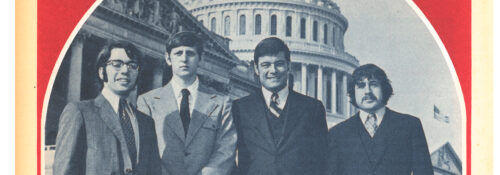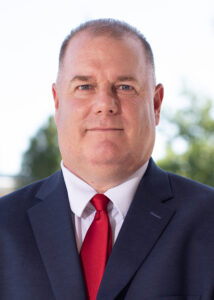
The Pioneers of WHIP
Written by Doug Goodnough
Eric Licht, ’74, was working at his uncle’s factory in Rhode Island over Christmas break when his mother called. She said someone from Hillsdale College—where he was attending at the time—was trying to contact him.
That someone was then-College Vice President Clark Durant, who was recruiting students for a special new program.
“He said, ‘Can you come back to school right away?’” said Licht, who was a native of Dover, Massachusetts. “’I want to talk to you about this program we are developing in Washington, D.C.’”
Licht drove back to campus, and after some persuasion by Durant, agreed to be one of four students enrolled in the Washington-Hillsdale Internship Program, now fondly referred to as “WHIP.”
More than 50 years later, Licht said he still vividly remembers that first WHIP experience.
“The Hillsdale program had a dramatic impact on my life,” said Licht, who went on to spend the next four decades working for conservative public policy efforts. “I was glad to be one of the pioneers.”
Licht, Craig Fitzgerald, Tucker Watkins, and Steve Wallach were the first Hillsdale students to take WHIP in the spring semester of 1973. The program was developed as a “behind-the-scenes experience in the legislative process.” Students enrolled in three classes (nine credit hours) at Georgetown University on focused political topics, and then received another six credits of internship experience. That experience included working for members of Congress in helping with research and other legislative work. One of those Congressmen was Hillsdale alumnus Rep. Philip Crane (R-Illinois).
Licht, a junior at the time, said the four students lived in a townhouse on East Capitol Street just a few blocks from the U.S. Capitol. He remembers a defense policy course, and one focused on World War II. He said a third course, “Psychology with Politics,” was being taught by former U.N. Ambassador to the U.S. Jeanne Kirkpatrick, but “we didn’t want to take the course,” Licht recalled. “But we liked her.” Instead, they took a political philosophy class.
Fitzgerald was just a sophomore from metro Detroit when he decided to accept the WHIP opportunity. He said the adjustment from the suburbs to small-town living to the hustle and bustle of Washington, D.C., was “dramatic.” However, he said the courses were even a bigger adjustment for a student who was taking first-year courses at Hillsdale.
Fitzgerald said classes were clustered on a couple of days a week, and the commute could be daunting with the D.C. traffic.
“When you were doing things with Congressional people, you were walking,” he said. “There was not a great deal of social interaction, beyond living with a couple of other guys.”
He did notice the D.C. social scene was a bit different than the social scene at Hillsdale.
“It was much more sophisticated, a little stuffy, a little more reserved,” Fitzgerald said. “There were no support mechanisms there for us, so you just sort of focused on what you were there to do, which was to learn as much as you can, to have experiences that you couldn’t have elsewhere, and do well for yourself.”
With the Watergate scandal emerging during their time in D.C., Fitzgerald said the city was “immersed” in political news.
“There’s probably no city in the country that is as focused on one singular topic,” he said. “There was (political) news on TV from 4 o’clock in the afternoon until 9 or 10 at night on so many channels. It was just different from what my experiences in news were prior to that.”
Although their lives after WHIP took different directions, Licht and Fitzgerald both said the experience has made a lasting impact on their lives.
Licht, who was a junior during WHIP, graduated in the spring of 1974 and worked in the auto industry for a few years. However, he decided he wanted to get back into politics and public policy.
Ed Feulner and Paul Weyrich, who were both involved in WHIP’s early years, were now career contacts for Licht. He wrote a letter to Feulner, who was the founder and the first president of the Heritage Foundation, a leading conservative think tank in D.C. Feulner forwarded that letter to Weyrich, who was the chief of staff for U.S. Sen. Carl Curtis of Nebraska during their internship but was now starting his own think tank.
“He hired me on the spot,” Licht said.
Licht spent nearly four decades working for Weyrich in public policy and fundraising for various organizations. He also met regularly with a young professor-turned-politician named Newt Gingrich, who eventually became the Speaker of the House during what Licht calls the “Republican Revolution” of 1994. Licht also was involved in numerous public policy issues, including the eventual end of the Soviet Union.
While Licht used WHIP to launch his career, Fitzgerald said the program sparked a personal lifelong passion for politics. After WHIP, he finished his bachelor’s degree at the University of Michigan and spent his career as an accountant and financial consultant. But his love for politics—and Hillsdale College—continues.
“It created this predominant interest that I’ve had lifelong since then in politics,” Fitzgerald said. “I continue to be involved in Hillsdale. Great experience. Great college. I couldn’t recommend it more strongly to others.”
Licht, who retired and moved from the D.C. area to South Carolina, said he was honored to be a part of the first WHIP class.
“Without Hillsdale, I never would have been involved with any of it,” he said of his career in politics.
Doug Goodnough, ’90, is Hillsdale’s director of Alumni Marketing. He enjoys connecting with fellow alumni in new and wonderful ways.
Published in December 2022
